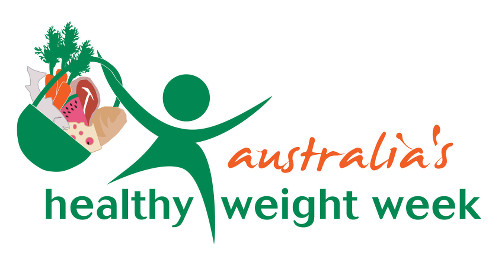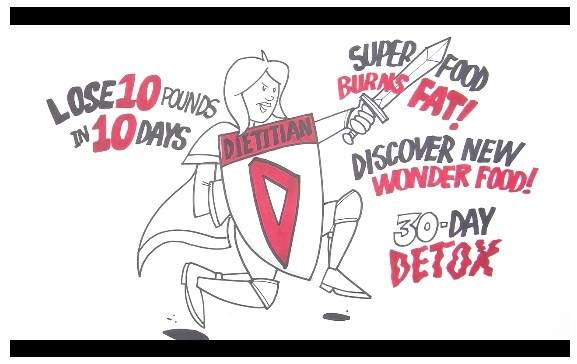PEN eNews 5(5) February 2016
PEN
® eNews is a monthly e-newsletter shared with the global PEN Community and created to help dietitians position themselves as leaders in evidence-based nutrition practice. In addition, users of the PEN System will find articles on the new evidence, resources and features available and how to maximize one's use of PEN.

How to navigate in the grey areas of dietetics
Lists. Tips. Do’s. Don’ts. New perspectives and research continues to evolve in this exciting field of nutrition and dietetics. While this makes for a very stimulating career, it also creates a never-ending pressure for dietitians to create or respond to communications or questions around food and nutrition:

In between new ideas and the evidence that supports or refutes them is a grey area where dietitians must navigate and offer interim guidance relevant to their immediate situation. The challenge for dietitians is how to navigate these areas where we have less certainty.
Recently a blog post on Real Scientific Literacy by Steven Novella caught my attention (1). Within his argument, he writes that science is tentative and always has error bars.
“There is a tendency to treat scientific claims with a false dichotomy – true or false, fact or myth. This is a convenient shorthand for claims that are almost certainly true or almost certainly false, but it can obscure the fact that many scientific claims are somewhere in the middle.”
He goes on to suggest that we need to teach people to think about the degree of certainty attached to every scientific fact or claim and offers seven
categories of certainty within which to assess the such facts or claims:
- rock solid
- very confident
- somewhat confident
- controversial
- speculative
- minority or fringe idea
- disproved and rejected.
There are many evolving ideas in the field of nutrition and dietetics that could fit within these categories of certainty:
food and detoxification,
Paleo diet and chronic disease,
dietary intervention for fibromyalgia and more!
While there may be other categories to consider, Novella’s categories of certainty offer a practical way to help organize thinking around emerging issues in food and nutrition, and may help to frame your response to the immediate question at hand. Knowing that the answer is not likely true or false, but rather a degree of certainty may help with navigating dietetics and maintaining open conversations to ideas in our sometimes-controversial field.
In this issue of PEN
® eNews 5(5), we:
- Showcase three Canadian dietetic educators who offer their perspectives on evidence-based teaching in dietetics in Dietetic educators reflect on the Evidence of Evidence-based Teaching in dietetics
- Feel the energy of Australia’s Healthy Weight Week Eat better, feel better, see an APD! Australia’s Healthy Weight Week 2016
- Share our insights into the challenges of nutrition and dietetics in What keeps dietitians up at night? 10 reasons why you can’t sleep.
- Link you to timely resources in What you need to promote the International Year of Pulses 2016
- Highlight 11 resources to help you provide evidence-based guidance on sugar in our Evidence Highlights.
- Show you a sampling of what content is new and updated in the PEN® database and how to access client handouts from our PEN® handouts collection.
- Enjoy PEN® eNews 5(5)!
References:
1) Novella S. Real scientific literacy. The Ness Blog. 2016 January. Available from:
http://theness.com/neurologicablog/index.php/real-scientific-literacy/
Kristyn Hall MSc, RD
Editor, PEN® eNews
A Publication of the PEN
® System Global Partners, a collaborative partnership between International Dietetic Associations.
Learn more about PEN.
What's New in PEN®
Below is a quick glance at some of the new and updated content in the PEN
® knowledge database. Look for the new

and updated

symbols in PEN to see more new and enhanced content!
Updated Knowledge Pathways
Professional Tools
Client Tools
New Practice Questions
Updated Practice Questions
- What are the indications for the use of vitamin/mineral supplements during pregnancy?
- What lifestyle factors (including body weight, diet and vitamin/mineral supplements) play a role in the treatment of infertility in women?
- Are there any risks with regard to alcohol consumption specific to individuals with diabetes?
- What types of formulas are suitable for formula-fed infants and for what duration?
- Why is iron-fortified formula recommended for formula-fed term infants? What is the recommended level of iron fortification in formula?
- How often should healthy term infants (born after 37 weeks gestation) have their growth assessed using weight, length and head circumference measurements?
- Which growth charts should be used for monitoring children's growth?
- Are there significant differences in the growth patterns of infants, birth to one year of age, who are breastfed versus formula fed?
- What role does growth monitoring have in identifying nutrition-related problems in infants, children and adolescents?
- What is the recommended weight gain in pregnancy?
- What factors are associated with postpartum weight loss?
- Are there any nutritional concerns for women having closely spaced pregnancies?
- Can web-based management tools used in diabetes management improve diabetes outcomes?
- Can quinine help prevent or alleviate leg cramps?
- Is there a role for any particular nutrients in the prevention or alleviation of leg or muscle cramps during pregnancy?
- Is there evidence to support a benefit for taking omega-3 fatty acid supplements during pregnancy?
- What steps can be taken to decrease the risk of Enterobacter sakazakii (Cronobacter spp.) infection and illness from powdered infant formula among infants?
- What dietary recommendations can benefit women without diabetes who experience hypoglycemia during pregnancy?
- Do dietary supplements affect glucose control in adults with diabetes and can these products be safely recommended for use for this population?
- What are the recommendations for the preparation, use, handling and storage of infant formula?
- In healthy adults and adults with chronic disease, what is the impact on health behaviour change of telehealth interventions (i.e. telephone, Internet/web-based, email, text messaging, mobile applications) delivered by health care providers compared with usual care? Are telehealth interventions cost-effective?
- What are the characteristics of effective telephone counselling to achieve health behaviour change in adults (i.e. intensity, duration, type of clients, characteristics of providers)?
- Are green coffee bean extract supplements safe and effective for weight loss among overweight or obese adults?
Trending Topics
How Do I … access PEN® client handouts from the PEN® Handout Collection?
Written by Jane Bellman MEd, RD
Kerri Staden BSc, RD Dietitians of Canada
PEN® Resource Managers
What are food sources of iodine? What are diet and cancer prevention basics? What are eating guidelines for food allergies and intolerances? Take a look at our PEN® Client Handout Collections. The number of client handouts has grown over the years, so PEN has redesigned the handout collection to make handouts easier to access and use. Outlined below is how you can access the handouts.
The PEN
® Handout Collections are available from the
PEN home page:
Individual handouts are also identified in relevant search results.
There are now seven handout categories available:
There is a + symbol next to some of the categories, that when clicked display subcategories and their related handouts. Click on each category to see the lists of PEN client handouts available.
Need handouts in a language other than English?
- Most handouts have been translated into French.
- Some have other language translations (Chinese, Hindi, Gujarati, Punjabi, Spanish, Tamil, Urdu and Vietnamese)
Need handouts that have been adapted to cultural foods?
- There are cultural adaptations to some handouts: African, Caribbean, Chinese, Gujarati, Hispanic, Latin, North and South Asia, North and South Indian, Pakistani, Sri Lankan. Some of these have also been translated as in the example below: Heart Healthy Eating: Triglycerides – Adapted North Indian and Pakistani and translated into Gujarati, Hindi, Punjabi and Urdu
Here is an example in the Cardiovascular Disease subcategory under Disease Conditions:
You also have the option of seeing handout titles in French. At the top of each category under the title is English/Français option tab and when you click on Français you will see the handout titles in French.
Did you know you can share and customize handouts?
- Add your customized nutrition advice to the Notes section by entering them from your computer under the ‘Additional Notes From Your Health Care Professional’, (See How do I…Customize Notes to Client Handouts) or you can write your comments in the Notes section of a printed copy.
- Add your company logo in the Distribution By box
- Print out or email the handouts to your clients.
To learn how to complete these actions, you can:
We hope the redesign of the Client Handout Collection helps you in your practice.
As always, we welcome your feedback.
PEN® Resource Managers:
Jane Bellman MEd, RD
Kerri Staden BSc, RD
Dietetic educators reflect on the Evidence of Evidence-based Teaching in dietetics
Evidence-based teaching – the use of instructional practices shown empirically to enhance learning – was the topic of a recent blog post (Weimer2015). The author posed questions about evidence-based teaching and described a classroom observation tool that identifies 21 specific, evidence-based, observable behaviours and practices of the instructor. The author acknowledges that this classroom observation tool is a starting point to help transfer the learnings from instructional research to instructional practice.
Flexibility in evidence-based teaching
I often find myself reflecting on teaching techniques used in classrooms – some work and some don’t, which leaves me working out what might function better the next time. Upon reading the comment article by Weimer (2015) as she presented a tool for assessing evidence-based teaching (Eddy, Converse, & Wenderoth, 2015), I realized that my reflections often work through application of experience, evidence and theory to inform teaching practice.
I was struck by the work conducted to develop the classroom assessment tool. It reflected much of the work completed recently for the Canadian dietetic profession. The ICDEPs (Integrated Competencies for Dietetic Education and Practice) also identify observable actions that are rooted in evidence-informed practice. The dietetic profession in Canada is also in the first couple of years of this process for academic education. We have an extensive list of dietetic practices, yet as stated by Eddy, Converse, & Wenderoth (2015), “Some elements may not be perfectly captured by these types of measures.” Each competency encompasses many actions leading to complexities in measuring them.

This potential use of such tools reminded me of a learning evaluation study completed with colleagues (Wadsworth, Johnson, Cameron, & Gaudet, 2012). The study assessed use of an experiential learning style, exploring how students incorporated theoretical concepts through practice and how they brought experiences back to the classroom to more clearly discuss theory. There were so many aspects to the learnings of students, that a single, static tool would not cover it all. For a publication we focussed solely on empowerment as an outcome, which seemed expansive and limited at the same time.
Learning is multifaceted with individuals learning in different ways. For this reason, as an educator I’ve strived to include multiple teaching methods to allow access for all types of learners. However, use of various evidence-based teaching techniques may not lend itself well to the type of assessment tool presented in the article, unless the tool remains updated with current evidence and practice.
In summary, while the topic of evidence-based teaching will remain part of my professional reflections, at present I have some concerns about developing a single list of actions for teaching assessment, even though evidence-based. Such a list would need to be clearly recognized as a living document, frequently changing and that it may be unable to fully reflect learning from both facilitator and learner standpoints as learning is dynamic process. That said, such tools and discussions do help educators to recognize the need for incorporating several teaching techniques.
A challenge that will always exist is that classrooms facilitators and learners change each day – their attitudes, interest and external stressors. These and other factors impact classroom engagement. Educators must remain flexible to approach the needs of learners and thus, learn to be comfortable working in the grey zone.
References:
- Eddy, S.L., Converse, M., & Wenderoth, M.P. (2015). PORTAAL: A classroom observation tool assessing evidence-based teaching practices for active learning in large science, technology, engineering, and mathematics classes. Cell Biology Education-Life Sciences Education, 14 (Summer), 1-16. http://www.facultyfocus.com/articles/teaching-professor-blog/evidence-of-evidence-based-teaching/
- Wadsworth, L.A., Johnson, C.J., Cameron, A.C., & Gaudet, M. (2012). (Re)Focusing on local food systems through service learning: Empowering pedagogy in a human nutrition degree program. Food, Culture & Society, 15(2), 315-334.
- Weimer, M. (2015). Evidence of Evidence-Based Teaching. Faculty Focus. Higher Ed Teaching Strategies, (December 2).
Written by:
L.A. Wadsworth, PhD, PDt, FDC
Antigonish, NS CanadaEvidence-based education in dietetics?
In
Evidence of evidence-based teaching, Weimer (2015) advocated for applying the concept of evidence-based practice to teaching and learning. Owing to our interests in development/evaluation of dietetics education, we considered Weimer’s post related to dietetics education.
What is evidence-based education?Promotional material for Evidence-Based Education in the Health Professions: Promoting Best Practice in the Learning and Teaching of Students (Brown & Williams, 2013) reads
“Evidence-based education is an attempt to find, critique and implement the highest quality research evidence that underpins the education provided to students.”
In preparing the chapter on dietetics education, MacLellan (2013) reviewed 36 studies from 1990-2013 on dietetics education and concluded that it was based largely on expert opinion and student preferences/perspectives, and that this was an understudied area, with little incentive to pursue this type of inquiry.
Are dietitians interested in research on dietetic education?It seems plausible to expect that dietitians would be interested in research on best practices in dietetic education due to the creation and success of the Dietetics Educators’ Network (Dietitians of Canada), sessions on dietetics education at our national Dietitians of Canada conferences and the annual meetings of dietetic educators.
We wondered then, why there is a limited amount of published research in this area? Perhaps it is due to the limited funding available for this type of research and the lack of a journal dedicated to this topic, as is the case in many other disciplines. Perhaps it is due to the tendency in our profession to not question longstanding education and training practices, or to not appear to offend or to appear disrespectful to those who developed dietetics education and traditional training practices.
When we were both on Dietitians of Canada’s Advisory Committee for Professional Affairs, we advocated for and got educational evaluation to be included as one of the Canadian Foundation for Dietetic Research grant funding categories. This was one step toward an evidence base for dietetics education. We still have a long way to go to catch up to other health professions (e.g., nursing, occupational therapy) in exploring best practices in teaching. As dietitians, we pride ourselves on basing our practice on evidence. Is it not time to put the same emphasis on evidence based teaching and learning practices in dietetics?
References:
- MacLellan D. (2013). Evidence-based education in nutrition and dietetics. In Evidence-Based Education in the Health Professions: Promoting Best Practice in the Learning and Teaching of Students (2013), Brown T and Williams B (Eds.). Boca Raton, FL: CRC Press.
- Weimer, M. (2015). Evidence of evidence-based teaching. Faculty Focus: Higher Education Teaching Strategies from Magna Publications. At: www.facultyfocus.com/articles/teaching-professor-blog/evidence-of-evidence-based-teaching/
Written by:
Catherine Morley, PhD, PDt, FDC
School of Nutrition and Dietetics
Acadia University, Wolfville NS
Eat better, feel better, see an APD! Australia’s Healthy Weight Week 2016
Smart eating, cooking at home and choosing the right portions are key for those looking to be a healthy weight. They are also the themes of this year’s Australia’s Healthy Weight Week (AHWW). This initiative of the Dietitians Association of Australia (DAA) celebrated from 15 – 21 February is in its ninth year and promotes Accredited Practicing Dietitians (APDs) as the experts in weight loss and healthy eating advice.
In 2016 we are excited to launch new versions of our online
cookbook and
social media toolkit which are available to download and use for free. AHWW also provides Australian consumers with
nutrition fact sheets, including information sourced from PEN
®’s
Food Skills Background.

Our AHWW launch event held in Adelaide Australia kick-starts the week on Monday 15 February and will include live cooking demonstrations from AHWW Ambassadors Sprout. APDs around the country will then hold events at their workplaces and in their community for the rest of the week. We are also running a
Twitter chat and
Instagram competition throughout the week. Make sure to follow us on all social media channels, and where possible use the hashtag #AHWW for posts throughout the week.
Cooking pledge and Instagram competition
Why: Get involved from home and inspire your social networks to do the same!
Where: Visit the AHWW website Cooking pledge and Instagram competition
What: Cooking at home allows you to manage your portion sizes and increase your vegetable intake.
Details: Pledge to cook at home during AHWW 2016, and receive a bonus recipe via email. Using this and our AHWW cookbook as inspiration – create a meal at home and share on your Instagram account to win a trip to Adelaide to cook with Callum Hann and Themis Chryssidis. Visit our website for full terms and conditions.
Get involved in AHWW - visit healthyweightweek.com.au and get inspired to help people achieve a healthier weight and lifestyle.
Natalie Latham APD
Communications Dietitian
Dietitians Association of Australia
What keeps dietitians up at night? 10 reasons why you can’t sleep
Are you a dietitian and cannot sleep? Here are 10 reasons why you might be having trouble sleeping.
- Information overload - Nutrition is a broad topic. There are >20,000 nutrition citations each year in PubMed (research database). Dietitians are expected to maintain expertise in nutrition, but we are drowning in information and evidence. How do you know what information to consider and what to ignore?
- Translating science to practice is complicated. Evidence-based information needs to be combined with the dietitian's expertise and judgment and the client’s or community’s unique values and circumstances to guide decision-making and counselling in dietetics. This is complicated work.

- Science evolves. How can dietitians be confident that they are using the most up-to-date evidence and resources to inform dietetic practice?
- Lack of Time - It is time consuming to stay on top of new information as well as to translate nutrition science into digestible pieces of information that their clients and patients can “consume”.
- Negotiating the ‘nutrition jungle’ – The media love to profile nutrition controversies. Dietitians need to apply evidence-based process to combat nutrition misinformation. We also need to convey that, despite media reports on the latest nutrition miracle or failure, complicated questions about diet and health require evidence from many different types of studies over many years before the weight of evidence shifts toward consensus.
- The public not understanding the difference between a dietitian and nutritionist - dietitians compete with unregulated nutrition professionals. Dietitians want recognition for their expertise in the nutrition field. How can we help differentiate the “voice” of a dietitian, over and above the nutrition “noise” in the nutrition jungle.
- There are many places where dietitians can go for nutrition information –Dietitians need to access the research, to be able to critically appraise the evidence, examine how this evidence impacts their practice, and also need to have access to tools and resources that are reflective of this best evidence. Dietitians are busy and need quick, reliable information sources.
- Continuing Education Requirements – As professionals, dietitians are required to stay up-to-date, achieved through a variety of continuing education opportunities. Continuing education is time consuming and expensive. Where will they go for their continuing education? What activities will they complete? Are these continuing education activities accessible and available?
- Access to unbiased practice guidance - Because food and nutrition are integrally related, there is a problem with accessing unbiased nutrition information i.e. nutrition information that is not influenced by industry or commercial interests as well as personal biases (belief-based biases, narrative reviews and consensus statements). Dietitians need ready access to timely information that they can trust and know is independent of personal, commercial and industry influence.
- Working with Diversity - Dietitians work with diverse populations and need tools and resources that are translated and are culturally appropriate.

The Practice-based Evidence in Nutrition
® (PEN) team understands your sleepless nights – because we are dietitians too! Like you, we have practice-based questions for which we need unbiased evidence-based answers. If you haven’t already, check out our
PEN® database to
see how we can help support your dietetic practice, so you can rest at least a little bit easier! We look forward to connecting with you and to continued work with you in 2016.
Written by:
Kristyn Hall MSc, RD
PEN
® eNews Editor and Social Media Lead
What you need to promote the International Year of Pulses 2016
Let’s get ready to work together to promote the International Year of Pulses 2016! This official United Nations event provides us with an opportunity to profile the role of dietitians in supporting the health of the population through food sustainability. For example, pulses have nitrogen-fixing properties which can improve soil fertility and eliminate dependency on synthetic fertilizers.
Dietitians of Canada volunteered to prepare promotional materials for the International Year of Pulses 2016 to support all International Confederation of Dietetic Association (ICDA) members.
The official site of the IYP 2016 is http://www.fao.org/pulses-2016/
Share the images previewed below with your clients and patients, or on social media.
For best results, we have created four versions of each image that are the proper size and dimensions for the following platforms:
Facebook (940x788 pixels)
Twitter (1024x512 pixels)
Instagram (1080x1080 pixels)
PowerPoint presentation (.pptx)
You can download these images here.
Les graphiques sont aussi disponibles en Français!.
For further details about the work of the United Nations, visit the Food and Agriculture Organization of the United Nations website and review the 2030 Agenda for Sustainable Development released in September 2015. The Agenda includes goals and targets to end global poverty and hunger.
Submitted by Kate Comeau MSc, RD
Manager, Public Relations and Media
Dietitians of Canada
Our social media strategy connects dietitians from around the world through our Facebook, Twitter and LinkedIn profiles.
Our social media content can be shared with your own network, further helping to position dietitians as leaders in promoting health. Social media can be used to help with knowledge transfer of new evidence to inform your dietetic practice. You can also use it to find out about our database features. Come be social with us! Follow PEN® on Twitter, like us on Facebook or connect with us on LinkedIn.
Evidence highlights: 11 Resources to help you provide evidence-based guidance on sugar
Being asked about sugar? PEN has over 300 resources to help you provide evidence-based guidance on questions around sugar. Here are 11 resources to get you started:
Knowledge Transfer Events and Resources
Have a look at some of the blog posts, web articles and peer-reviewed articles that caught our attention.
Blogs posts and web articles: Intermittent Fasting. Click here
Randomized trials are no panacea for what ails nutrition research. Click here
CSACI Position statement on the testing of food-specific IgG. Click here
Real Scientific Literacy. Click here
How universities can help students avoid plagiarism: get them to write better. Click here
Spoof Diets. Click here
PEN
® does not have editorial or other control over the contents of the referenced Web sites. We are not responsible for the opinions expressed by the author(s) of the knowledge transfer events and do not endorse any product or service.
Contact Us
Do you have comments, questions or feedback? Please contact us:
Jayne Thirsk RD, PhD, FDC
Director of PEN®
Dietitians of Canada
jayne.thirsk@dietitians.ca
Sammie Gill BSc (Hons), PGDip, R.SEN, RD.
Policy Officer (Evidence-based Practice).
British Dietetic Association
globalpen@bda.uk.com
Natalie Latham APD
Communications Dietitian
Dietitians Association of Australia
communications@daa.asn.au
Kristyn Hall RD, MSc
Editor of PEN
® eNews
Dietitians of Canada
eNews@pennutrition.com
PEN eNews
February 2016 Volume
5 (5)
A Publication of the PEN® System Global Partners,
a collaborative partnership between International Dietetic Associations.
Learn more about PEN.
Copyright Dietitians of Canada
. All Rights Reserved.